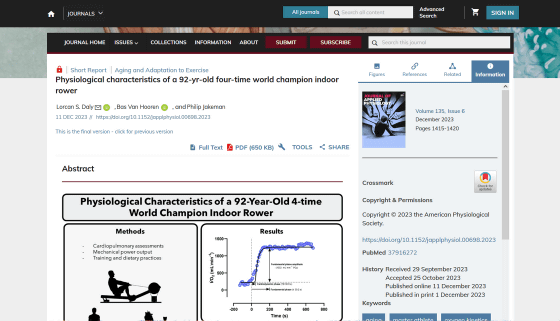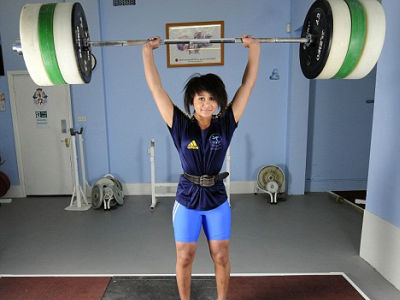What is the secret of a man who started exercising in his 70s and became a world champion in indoor rowing even though he is over 90 years old and has the aerobic ability of a 30-40 year old?

Many people may think, ``If you don't exercise when you're young, your body will decline as you get older,'' but even if you start exercising late in life, there are many health benefits. You can get it. The Washington Post, a major daily newspaper, said that he started exercising in his 70s, and even at the age of 92, he had the aerobic fitness of a 30- to 40-year-old, and was a four-time world champion in indoor rowing. I'm reporting on men.
Physiological characteristics of a 92-yr-old four-time world champion indoor rower | Journal of Applied Physiology
https://journals.physiology.org/doi/abs/10.1152/japplphysiol.00698.2023

At 93, he's as fit as a 40-year-old. His body offers lessons on aging. - The Washington Post
https://www.washingtonpost.com/wellness/2024/01/16/fitness-aging-richard-morgan/
Researchers from the Netherlands and Ireland set out to find out whether age-related declines in muscle strength and physical fitness are inevitable, and whether these declines can be partially compensated for through exercise. I decided to investigate the person. Richard Morgan, the grandfather of Lorcan Daly, an exercise scientist at Shannon Institute of Technology in Ireland, was chosen as the subject of the study.
Mr. Morgan, who is 93 years old at the time of writing this article, is an indoor rower who competes indoors in rowing motion, and in 2022 he won the world championship in the lightweight division for 90 to 94 years old. Looking at this alone, you may think that he is simply an excellent athlete, but what is special about Mr. Morgan is that he did not participate in sports or exercise until he was 73 years old.
Morgan, an Irishman, worked in a bakery and at a battery manufacturer, but due to arthritis in his knees, he did not exercise regularly until he was in his 70s. One day, Morgan, who had retired from work and had a lot of free time to spare, went to a practice session with one of his grandsons, who was a rower in college, and used a machine his coach had recommended that allowed him to row indoors. . Since then, Morgan has become obsessed with indoor rowing and has become a four-time world champion in his age group.
Bas van Hollen, a member of the research team and a postdoctoral researcher at Maastricht University in the Netherlands, commented, ``If we want to understand aging, we need to look at very active older people.'' They argue that if some people can stay strong as they get older, others might be able to stay healthy as well.

The research team invited Mr. Morgan, who was 92 years old at the time, to the laboratory and measured his height, weight, body composition, metabolism, and cardiopulmonary function, as well as interviewing him about detailed dietary menus and training methods. After that, they got on an indoor rowing machine and tried a 2000m time trial while monitoring their heart, lungs, and muscles.
As a result of the measurements, Mr. Morgan has 47.7 kg of muscle, which is equivalent to 80.6% of his body weight, and his body fat percentage is 15.4%, which is considered healthy even for a man who is several decades younger than Mr. Morgan. It turns out that it is. In addition, his heart rate during the time trial reached a peak of 153 beats per minute, indicating that he had an extremely strong heart, one of the highest in history for someone in his 90s. The ``oxygen uptake dynamics,'' an indicator of cardiovascular health, was comparable to that of a healthy 30- to 40-year-old.
'This was the most exciting day I've ever spent in the lab,' said Philip Jakeman, lead author of the paper and professor of health and aging at

What was particularly impressive, the researchers say, was that Morgan built this extraordinary body with a simple and relatively easy exercise routine. The characteristics of Mr. Morgan's training and lifestyle habits are as follows.
Consistency: Morgan continues to train, averaging about 40 minutes a day and 30km a week on a rowing machine.
- Combining multiple training intensities: 70% of the workouts are very low-intensity, and Morgan says he rarely pedals the machines. The remaining 20% is a difficult but tolerable medium-intensity load, and the remaining 10% is a high-intensity load that is barely manageable.
- Weight training: Two or three times a week, Morgan uses adjustable-weight dumbbells to perform about three sets of
High-protein diet: Morgan consumes more protein than many older adults, exceeding the commonly recommended intake of 1g of protein per kg of body weight per day. It is said that there is.
Morgan said through his grandson, ``There is definitely joy in winning a world championship.I started competing from scratch, but one day I suddenly felt the joy of playing this sport.'' commented.

At 93 years old, Mr. Morgan's health and fitness suggest that significant loss of muscle and aerobic capacity is not inevitable even with advancing age. It has been pointed out that there are many rowing athletes in Mr. Morgan's family, so it has been pointed out that there may be genetic factors, and it is certain that Mr. Morgan's performance has decreased year by year. However, Mr. Morgan shows that exercise may slow down the decline of the body, even if it does not completely eliminate the effects of aging.
'This is an interesting case study that sheds light on our understanding of exercise adaptation across the lifespan,' said Scott Trapp, director of the Human Performance Institute at Ball State University in the US, who was not involved in the study. 'We're still learning how to start, but the evidence is pretty clear that the human body maintains the ability to adapt to exercise at any age.'
Related Posts:
in Science, Posted by log1h_ik







